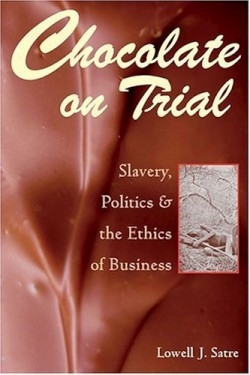Chocolate on Trial
Slavery Politics and the Ethics of Business
In 1909, the English press was abuzz with news about the libel trial of Cadbury Brothers vs. the London Standard newspaper. Cadbury, owned by the Quaker Cadbury family, had a reputation in England and abroad as a progressive and highly successful manufacturer of chocolate confectionery. The Cadburys, adherents to Quaker values and humanitarian policies, were members of the Anti-Slavery Society, as well as other liberal organizations in England.
Yet, critics began to call into question Cadbury’s business dealings with cocoa-bean plantations in the Portuguese colonies of Sao Tome and Principe. There was clear evidence that the “contracted laborers” were in fact slaves, who were condemned to a life of servitude, and who lived and worked in conditions that were not only deplorable, but inhuman.
The Standard, a conservative newspaper, was just one of many who began to look askance at Cadbury’s liberal ideals in light of mounting evidence that Sao Tome, as well as other Portuguese-run cocoa plantations, used slave labor. Why, the Standard asked, had Cadbury Brothers waited more than eight years to discontinue the purchase of cocoa from Sao Tome once it had been determined that Portugal sanctioned the use of servicases? As one reporter stated, “It is a strange instance of the topsy-turvydom of our economic arrangements that the cocoa and chocolate which are turned out in this country by philanthropic manufacturers … should have been grown under the most infamous and revolting conditions of murderous slavery.” Yet, this was not simply a moral issue, but one with significant political and economic implications.
The author, emeritus professor of history at Youngstown State University, weaves a spellbinding tale that explores the important socio-political and economic issues of the period. His meticulous research and deft characterization of the larger-than-life figures central to this historical account add value to this substantive book. From George Cadbury, son of the founder and chairman of the company, who sought to restore the reputation of the Cadbury family, to Henry Wood Nevinson, the journalist who first documented and described slavery in Portuguese West Africa and its other colonies, to William Cadbury, George’s nephew, who sought to influence Portugal to reform its labor practices, each is compelling and realistically portrayed.
Satre has written an important book, which serves as a cautionary tale for modern-day corporations. The question in 1909, as it is today, was to what extent should corporations be held accountable for the impact that adverse business practices have on other peoples and countries? To this, the author has provided an indisputable answer.
Reviewed by
Robin Dasher-Alston
Disclosure: This article is not an endorsement, but a review. The publisher of this book provided free copies of the book to have their book reviewed by a professional reviewer. No fee was paid by the publisher for this review. Foreword Reviews only recommends books that we love. Foreword Magazine, Inc. is disclosing this in accordance with the Federal Trade Commission’s 16 CFR, Part 255.

